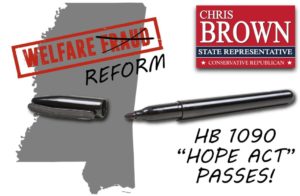
Representative Chris Brown Facebook
The Mississippi state legislature recently passed the formerly titled “HOPE Act” — now the Medicaid and Human Services Transparency and Fraud Prevention Act — allegedly aimed at eliminating fraud and increasing scrutiny over assistance program eligibility requirements. It currently awaits a signature from Gov. Phil Bryant.
On the surface, the legislation appears to hold the state programs more accountable. Once signed into law, it will allow the Division of Medicaid and the Department of Human Services to contract third-party vendors for a ramped-up verification-of-eligibility process for Medicaid, Temporary Assistance for Needy Families (TANF) and SNAP.
“The legislation prevents criminals from taking advantage of welfare recipients and taxpayers,” Mississippi State Rep. Chris Brown said in a recent statement. “It reduces the cost of the social safety net for state government” and “provides an incredible opportunity for folks who are able to move out of welfare dependency and poverty to a better life.”
However, critics believe the legislation is far from “hopeful” as it threatens to eliminate the benefits of many eligible recipients and make it more difficult to receive food and income assistance in the future.
“The bill sells itself as a way to eliminate fraud but, in reality, the extent of fraud is quite negligible in Mississippi,” says Matt Williams, research director for the Mississippi Low-Income Child Care Initiative. Williams acknowledges the state’s already existing measures to detect fraud, waste and abuse in its public assistance programs. “The whole idea that it’s going to root out fraud is both misguided and inaccurate.”
“In terms of the legislators that promoted this, it’s not going to be in the best interests of their recipients,” says Roy Mitchell, executive director of the Mississippi Health Advocacy Program. “And, I have no doubt there’s going to be some consequences for this legislation and for promoting what is obviously a punitive bill targeting Medicaid recipients.”
Under the legislation, an outside private contractor will determine when to send a written request for information proving eligibility to an assistance recipient. If the recipient does not respond in writing within 10 days, benefits are automatically terminated. Since recipients are commonly unemployed, disabled, transient or lack stable housing — and the process of proving eligibility is both complex and time-consuming — meeting such a deadline is highly improbable.
“What we are going to see is that people are going to miss that administrative deadline and eligible individuals are going to be kicked off,” says Williams, noting the legislation “is not going to save the state any money since a number of those folks will come back” at a later point.
What makes the legislation even more suspicious is that it was not homegrown but drafted from a template constructed by the Foundation for Government Accountability (FGA), a Florida-based right-wing advocacy group focused on welfare and health care reform. Under its “Stop the Scam” initiative, the FGA pushes states to “conduct regular eligibility reviews, ensuring limited resources are only directed to those who qualify.”
Such alleged accountability measures are far from isolated. They are part of an ongoing conservative effort to challenge eligibility in state-regulated processes like social services and even voting, while alleging “widespread fraudulent activity” with little basis in number or fact. These tactics are largely a function of the Koch brothers-funded State Policy Network where numerous free-market think tanks like FGA tout largely manufactured crises and pave the way for private contracts aimed at slashing the number of eligible registrants. According to FGA’s data, “state lawmakers in 29 states” including Georgia have now “implemented at least one of our model reforms.”
“Another thing that’s perplexing,” Mitchell says, “is that we reportedly have a $90-million deficit in our Medicaid program and, yet, we are writing a blank check to a third-party contractor for a need that was identified by an out-of-state policy group.”
Williams points to comparable scenarios in Illinois and Wisconsin where private contractor Maximus Inc. raked the states for millions while providing shoddy, error-prone and cost-inflated work. As a result, an independent arbitrator facilitated the cancellation of Illinois’ $77-million contract with Maximus.
“It’s even more puzzling to do this in Mississippi given the State Department of Human Services did a fiscal analysis showing it would take about $10 million to implement this,” says Williams, explaining how “hard it’s going to be for our state’s Human Services and Medicaid agencies to come up with this since they recently had their budgets slashed because of state deficits.”
He goes on to reveal the legislation has less-known yet as-harmful provisions that cut off benefits for families based on a determination of noncompliance. “A full household sanction means that benefits that are ultimately meant for children could be discontinued for something as simple as a parent or guardian missing an appointment,” says Williams. “That’s what noncompliance for any SNAP or TANF requirement could be.”
Another little-known provision prohibits any waivers to federal SNAP law, effectively taking the state’s power away to meet the needs of its most vulnerable citizens in times of such crises as a severe economic downturn.
“It’s hard to see this as anything other than an attempt to push a state contract to a private company,” Williams says. “And, the thing that is so terrible about it is the impact it’s going to have on people in poverty because they’re going to be the ones losing assistance.”


